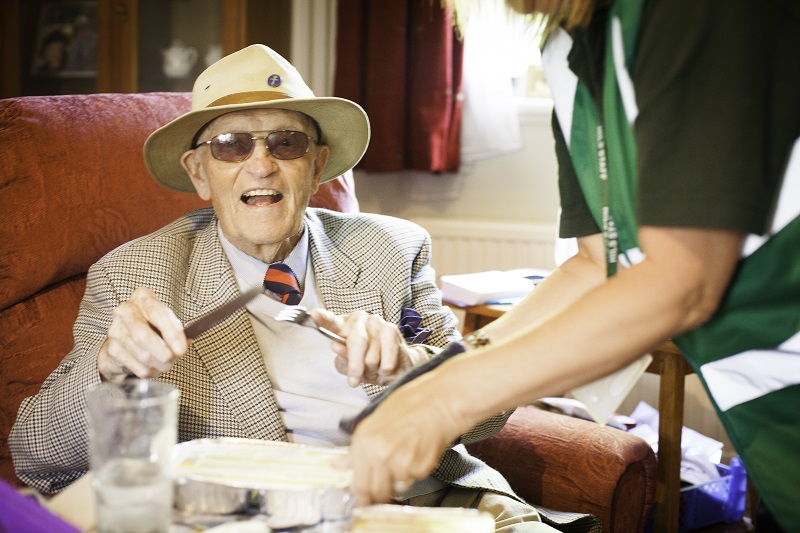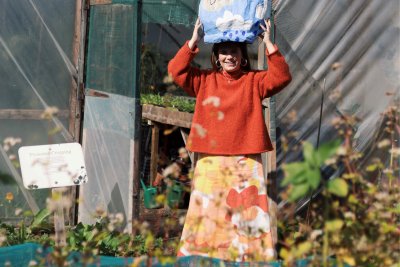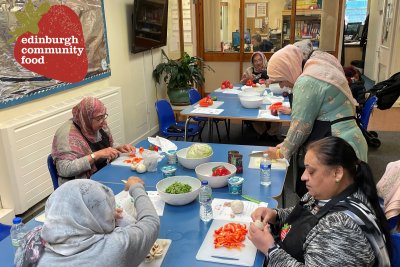Blogs • Older People’s Food Campaign
We need meals on wheels services all year round. But especially now.
Winter is upon us, along with a second wave of Covid-19 and further lockdowns. Morven Oliver-Larkin shares stories of the older people she met when researching these services in Spring 2020, and reflects on why we need these services now more than ever.

At the start of November, the National Association of Care Catering (NACC) brought us Meals on Wheels Week 2020. This celebration of the meals on wheels heroes up and down the country came at an especially timely moment. With a second lockdown upon us, and communities, charities and local government bracing for what may be needed this winter, it is absolutely clear that one vital element is a food service that will reach older or isolated residents.
The first lockdown saw incredible efforts from existing meals on wheels services to scale up their operations to meet new need, as well as valiant new meal delivery services from community groups, restaurants, catering companies, and caring individuals. I spent time talking to and researching these new and existing services, and learnt much about the vital role they played in keeping older people safe, nourished and connected in their homes.
Despite this vital role, no new funding to help maintain meals on wheels services has been announced, and many could not keep going beyond the initial weeks of our first lockdown. That’s why Sustain are calling on local people to write to their councillors, to demand investment in older people’s health and meals on wheels services. Whilst we need an adult social care funding settlement from national government which ensures councils can support services in the long-term, local government has a vital role to play here and now.
The action is now closed.
As part of that research, I had the privilege of speaking to several older people who used meals on wheels services or were in need of the service. Their stories brought home to me how integral this service is not only to the safety and physical health of our older neighbours, but also to wellbeing and peace of mind. Their stories complement the brilliant case studies outlined by the NACC, which highlight the inspirational examples of meals on wheels services from across the UK.
Real stories of why meals on wheels matter
Jane, 68, had fallen and broken her hip. As soon as it was medically possible, she left hospital, and signed up to receive meals on wheels. She had been receiving them for five months, and planned to slowly stop using them over the next month. She said that although she liked cooking, she was scared to do so whilst still in pain. Having the hot meal service meant that she would not do things that she felt were risky, such as going to get food shopping or cooking. She said she would not have been able to leave hospital for several months longer had the service not been available.
Christine, a woman in her 50s, was in bed when the meals on wheels provider and researcher arrived at 1pm. Karen, the meals on wheels delivery worker, said that Christine had mental health problems and often did not get out of bed for the day. Whilst Karen was plating up her food in the kitchen, Christine got up and slowly came through to the kitchen too. She was in silence for a little while but after a few friendly questions about what was on TV, she started talking a little. The visitors left her eating the meal at her kitchen table, up and out of bed.
Rasheed, a man in his 70s, said that he had no motivation to cook now that he lived alone. He had been a barrister, and had never seen meals as much of a priority. He said he was sad a lot now that he was retired and didn’t have the business of work, but also that he didn’t like large social spaces – lunch clubs and other community meals made him feel anxious and panicked. He said that without the meals on wheels service, he would just eat flatbread or toast.
Cynthia, a woman in her 80s, could not get up to open her door. She was unable to leave the house now, or to stand long enough to make a cup of tea or even some toast. She said that when the delivery staff come, on request they’ll also get her a snack, fill her water bottle, and make a new hot water bottle for her. This can settle her in for the next six hours, before a carer comes to help her to bed. She has lived her whole life in London, and used to have many friends in the area, but most have now passed away.
The stories above, taken as excerpts from my research, together show just how key these services have always been but are especially now. But without a formal shielding process and with inadequate or no n-existent meals on wheels services in many areas, there is no guarantee that older and other isolated people don’t go without this winter.
Government and councils must step in to protect and expand meals on wheels over this winter and beyond. Crucially government, councils, health bodies, hospitals and others must work together to maximise opportunities to sustain services. National government must properly fund adult social care, including food services such as meals on wheels. But councils have the power to invest in these services today. That’s why we are calling on councils to ensure there is funding for food support for older people in 2021/22 council budgets and asking that people join us by writing to their local councillor today.
Published Monday 9 November 2020
Older People’s Food Campaign: Meals on wheels services support thousands of older people every day to stay independent in their own homes and enrich their lives.





